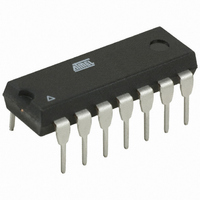AT89LP214-20PU Atmel, AT89LP214-20PU Datasheet - Page 12

AT89LP214-20PU
Manufacturer Part Number
AT89LP214-20PU
Description
MCU 8051 2K FLASH 20MHZ 14-PDIP
Manufacturer
Atmel
Series
89LPr
Datasheet
1.AT89LP213-20PU.pdf
(98 pages)
Specifications of AT89LP214-20PU
Core Processor
8051
Core Size
8-Bit
Speed
20MHz
Connectivity
SPI, UART/USART
Peripherals
Brown-out Detect/Reset, POR, PWM, WDT
Number Of I /o
12
Program Memory Size
2KB (2K x 8)
Program Memory Type
FLASH
Ram Size
128 x 8
Voltage - Supply (vcc/vdd)
2.4 V ~ 5.5 V
Oscillator Type
Internal
Operating Temperature
-40°C ~ 85°C
Package / Case
14-DIP (0.300", 7.62mm)
Processor Series
AT89x
Core
8051
Data Bus Width
8 bit
Data Ram Size
128 B
Interface Type
SPI/UART
Maximum Clock Frequency
20 MHz
Number Of Programmable I/os
12
Number Of Timers
2
Operating Supply Voltage
2.4 V to 5 V
Maximum Operating Temperature
+ 85 C
Mounting Style
Through Hole
3rd Party Development Tools
PK51, CA51, A51, ULINK2
Development Tools By Supplier
AT89ISP
Minimum Operating Temperature
- 40 C
Lead Free Status / RoHS Status
Lead free / RoHS Compliant
Eeprom Size
-
Data Converters
-
Lead Free Status / Rohs Status
Lead free / RoHS Compliant
9. System Clock
9.1
12
Crystal Oscillator
AT89LP213/214
The system clock is generated directly from one of three selectable clock sources. The three
sources are the on-chip crystal oscillator, external clock source, and internal RC oscillator. The
clock source is selected by the Clock Source User Fuses as shown in
clock division is used to generate the CPU clock from the system clock. See
Fuses” on page
Table 9-1.
When enabled, the internal inverting oscillator amplifier is connected between XTAL1 and
XTAL2 for connection to an external quartz crystal or ceramic resonator as shown in
Note that the internal structure of the device adds about 10 pF of capacitance to both XTAL1
and XTAL2, so that in some cases an external capacitor may NOT be required. It is recom-
mended that a resistor R1 be connected to XTAL1, instead of load capacitor C1, for improved
startup performance. The total capacitance on XTAL1 or XTAL2, including the external load
capacitor plus internal device load, board trace and crystal loadings, should not exceed 20 pF.
When using the crystal oscillator, P3.2 and P3.3 will have their inputs and outputs disabled.
When using the crystal oscillator, XTAL2 should not be used to drive a board-level clock without
a buffer.
Figure 9-1.
Note:
Clock Source
Fuse 1
1. C2
0
0
1
1
R1
Clock Source Settings
Crystal Oscillator Connections
72.
= 0–10 pF for Crystals
= 0–10 pF for Ceramic Resonators
= 4–5 MΩ
Clock Source
Fuse 0
0
1
0
1
C2
R1
Selected Clock Source
Crystal Oscillator
Reserved
External Clock on XTAL1
Internal 8 MHz RC Oscillator
~10 pF
~10 pF
Table
“User Configuration
9-1. No internal
3538E–MICRO–11/10
Figure
9-1.















